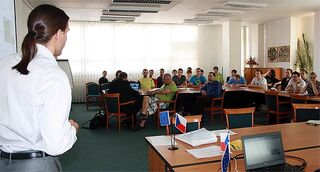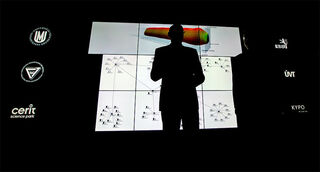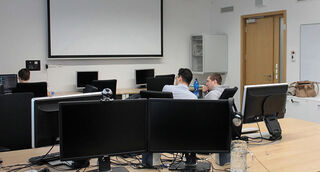Software systems and services management
Degree programme objectives
The study program develops a unique competency profile for students, based on the intersection of knowledge from multiple fields (T-shaped profile). These competencies are not only relevant for service development management but are also highly valued in the job market. A distinctive characteristic of this program is its focus on both strategic and operational management, covering the targeting, design, implementation, and operation of software systems and services within an organizational context. It also offers the possibility to specialize in secure operations or IT service management.
In addition to building upon theoretical and technological knowledge and practical software development skills acquired in undergraduate studies, this graduate program adds new dimensions, such as team, project, and process management, communication and soft skills, and essential business-related knowledge, including fundamentals of marketing and management.
As part of the newly introduced specialization Smart Service Design and System Thinking, students will gain the necessary knowledge for applying artificial intelligence (AI) and machine learning in service design. This does not involve AI development but rather focuses on practical application skills. Another key aspect of the program is its strong emphasis on systems thinking, particularly a holistic approach and its utilization for innovation management in the service sector. Professionals with these skills will be increasingly in demand not only in IT companies but across various organizations, including municipal and government institutions.
Graduates find employment across a wide range of businesses and organizations of different industries and sizes. At the same time, they are encouraged and given the opportunity for basic preparation in entrepreneurial innovation. A significant competitive advantage of graduates in this specialization is their ability to solve complex problems related to systems and service development management, leveraging their skills acquired through the program. Their career potential prepares them for management positions, such as Chief Information Officer (CIO), Project Manager, and Risk Manager. Additionally, new roles such as Service Designer or more precisely Service Architect are becoming crucial, as they understand the interconnections between services and manage entire portfolios of interrelated services.
The Cybersecurity Management specialization aims to specifically prepare graduates for roles that require a deeper understanding of cybersecurity challenges and the ability to handle tasks in this critically important field, which encompasses technological, legal, and organizational aspects. Expected job roles include Cybersecurity Manager, head of IT system administration or cybersecurity monitoring centers, as well as cybersecurity-focused IT service design management or cybersecurity education. Graduates can pursue careers across a broad spectrum of companies and organizations, as well as in their own businesses.
Study plans
Studies
- ObjectivesThe study program develops a unique competency profile for students, based on the intersection of knowledge from multiple fields (T-shaped profile). These competencies are not only relevant for service development management but are also highly valued in the job market. A distinctive characteristic of this program is its focus on both strategic and operational management, covering the targeting, design, implementation, and operation of software systems and services within an organizational context. It also offers the possibility to specialize in secure operations or IT service management.
In addition to building upon theoretical and technological knowledge and practical software development skills acquired in undergraduate studies, this graduate program adds new dimensions, such as team, project, and process management, communication and soft skills, and essential business-related knowledge, including fundamentals of marketing and management.
As part of the newly introduced specialization Smart Service Design and System Thinking, students will gain the necessary knowledge for applying artificial intelligence (AI) and machine learning in service design. This does not involve AI development but rather focuses on practical application skills. Another key aspect of the program is its strong emphasis on systems thinking, particularly a holistic approach and its utilization for innovation management in the service sector. Professionals with these skills will be increasingly in demand not only in IT companies but across various organizations, including municipal and government institutions.
Graduates find employment across a wide range of businesses and organizations of different industries and sizes. At the same time, they are encouraged and given the opportunity for basic preparation in entrepreneurial innovation. A significant competitive advantage of graduates in this specialization is their ability to solve complex problems related to systems and service development management, leveraging their skills acquired through the program. Their career potential prepares them for management positions, such as Chief Information Officer (CIO), Project Manager, and Risk Manager. Additionally, new roles such as Service Designer or more precisely Service Architect are becoming crucial, as they understand the interconnections between services and manage entire portfolios of interrelated services.
The Cybersecurity Management specialization aims to specifically prepare graduates for roles that require a deeper understanding of cybersecurity challenges and the ability to handle tasks in this critically important field, which encompasses technological, legal, and organizational aspects. Expected job roles include Cybersecurity Manager, head of IT system administration or cybersecurity monitoring centers, as well as cybersecurity-focused IT service design management or cybersecurity education. Graduates can pursue careers across a broad spectrum of companies and organizations, as well as in their own businesses.
- Learning Outcomes
After successfully completing his/her studies the graduate is able to:
- make reasoned decisions about the benefits of information technologies;
- use the principles of selected project management techniques in practice;
- competently communicate in their professional life;
- actively participate in and lead team projects using acquired soft skills;
- To understand the principles and be able to apply techniques and existing tools of artificial intelligence and advanced data processing in practice;
- make well-reasoned decisions regarding the design of smart services based on systems thinking and to implement such services – specialization in Smart Service Design and System Thinking;
- understand advanced concepts in the analysis, design, and implementation of secure systems and their safe operation – specialization in Cybersecurity Management;
- Occupational Profiles of Graduates
Graduates find employment in businesses and organizations of various industries and sizes while also being encouraged and given the opportunity for basic preparation in entrepreneurial innovation.
A key competitive advantage of graduates specializing in Smart Service Design and System Thinking is their ability to solve complex problems related to the management of smart service development, utilizing artificial intelligence techniques from a systems thinking perspective. Their potential prepares them for managerial positions, such as Chief Information Officer (CIO), Project Manager, and Risk Manager.
Graduates of the Cybersecurity Management specialization will primarily find opportunities in companies and institutions that require specialists capable of collaborating with relevant coordinating bodies and ensuring the management of cybersecurity processes. This includes roles such as Cybersecurity Manager and Chief Information Security Officer (CISO).
- Practical TrainingIn the Software Systems and Services Management study programme, students complete a compulsory internship of 10 weeks/400 hours within one semester. The student's activities during the internship must correspond to the so-called T-shaped focus, where in-depth knowledge and experience in computer science are required, as well as a broad overview and basic skills in other fields (economics, management, law, etc.). Information on internships can be found in the Course Catalogue, in the study materials of the course or on the website.
- Goals of Theses
The goal of Maters's thesis is to demonstrate that student is capable of working on a project of non-trivial size (e.g. to create a useful application, or to formulate and prove advanced mathematical thesis), as well as to demonstrate the capability of presentation and positioning of the results in the context of actual state-of-the-art in the field. Bachelor's thesis is expected to be written in Czech, Slovak or English language. Expected structure of the work includes declaration of the author about the thesis being a school work, declaration of authorship, contents, the proper text, and references. Minimal expected scope of the work is 40 regular pages of the proper text (including illustrations).
- Access to Further Studies
After completion of the studies, it is possible to continue in doctoral degree programme (after satisfying the admission requirements).




